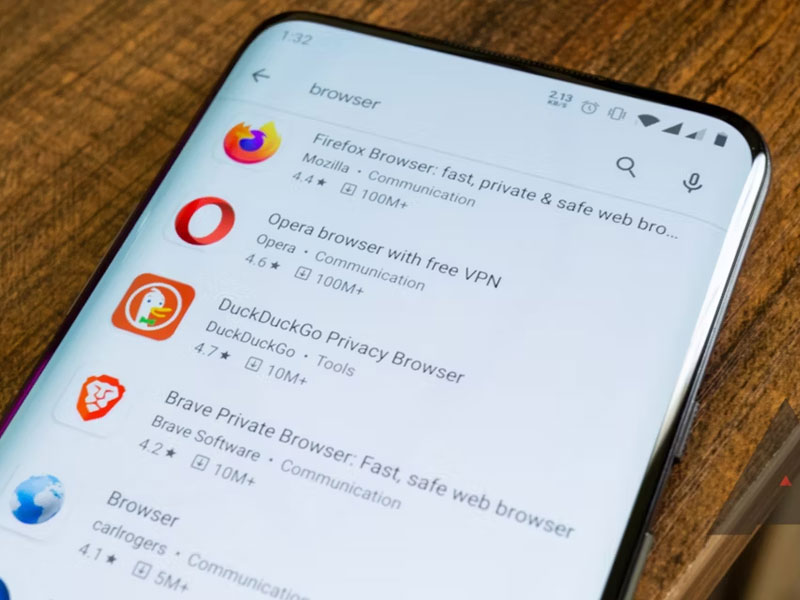
10 best web browsers on Android in 2023
Purchasing a new Android phone comes with its own set of nuts and bolts, including pre-installed apps and features nestled into a single (well-defined) ecosystem. Of course, browsing the web is a crucial activity for any user, and we usually don't blink twice if the default browser functions the way it should. But it doesn't mean we shouldn't consider other possibilities (like alternatives to an app store for your apps) to improve our browsing experience. Likewise, we have plenty of web browsers to choose from that are optimized for privacy, speed, and user design. So similar to how we've selected the best apps on Android, we've handpicked the top web browsers you can install on your Android device today.
Most Android-based web browsers use Chromium, the open-source version of Google Chrome. These web browsers have similar load times and will ultimately run the same way. So expect a similar performance across the board. But this is where Mozilla Firefox stands out and makes a winning case.
Firefox is one of the few browsers on Android with a custom rendering engine. Thanks to Mozilla rewriting Firefox for Android, the user experience has been relatively smooth and unique; the browser offers limited extensions, improved scrolling, and a bottom address bar (a welcomed feature for tall phones). It also optionally syncs most of your data with the desktop version, so you can continue browsing without interruption. It blocks tracking scripts by default, but you can still decisively lift or tighten these restrictions. Overall, Mozilla Firefox is a top-notch web browser that functions well as a dependable replacement.
Mozilla Firefox
Most Android-based web browsers use Chromium, the open-source version of Google Chrome. These web browsers have similar load times and will ultimately run the same way. So expect a similar performance across the board. But this is where Mozilla Firefox stands out and makes a winning case.
Firefox is one of the few browsers on Android with a custom rendering engine. Thanks to Mozilla rewriting Firefox for Android, the user experience has been relatively smooth and unique; the browser offers limited extensions, improved scrolling, and a bottom address bar (a welcomed feature for tall phones). It also optionally syncs most of your data with the desktop version, so you can continue browsing without interruption. It blocks tracking scripts by default, but you can still decisively lift or tighten these restrictions. Overall, Mozilla Firefox is a top-notch web browser that functions well as a dependable replacement.
Google Chrome
As expected, one of Android's most popular web browsers is Google Chrome. It's the default browser you will find on most devices, and for good reason. Google brings consistent updates, ensuring the default web browser is stable and working steadily fast. However, the Android version of Chrome comes packed with some notable features you might not be familiar with. For example, you can switch tabs by swiping left and right on the address bar, force websites to be dark when your phone is in dark mode, and much more. But chances are you have come looking for more than what the default Google Chrome app has to offer, which is why we've also included the Beta (slightly buggy) and Dev (buggy) versions below.
DuckDuckGo
Users looking for a private experience for web browsing that comes light with features should look to DuckDuckGo. For example, DuckDuckGo blocks tracking scripts by default and includes a privacy rating with a complete list of every blocked tracker. Most browsers have become equipped with tracking protection, but DuckDuckGo lays out the information transparently compared to the rest.
Not only does DuckDuckGo remove tracking scripts, but it also erases cookies after closing a tab (similar to Firefox Focus). It even includes an option to disable cookies for your favorite sites. Under the hood, DuckDuckGo uses Android's built-in rendering engine, so it should perform just as well as Chrome — so you're not giving up a lot by moving onto this alternative for your private browsing.
Samsung Internet
Samsung Internet started as the pre-installed web browser on Galaxy phones and tablets but later expanded to all Android devices in 2017. Currently, it is one of the most popular browsers on the platform, and it's jam-packed (or overloaded, depending on your standpoint) with features.
Samsung Internet comes with an entirely custom interface that fits with Samsung's One UI design language. Advantages of choosing this web browser over Chrome include tracking protection, a limited selection of add-ons, and a button layout paired that displays better on taller phones. In addition, the Secret mode is far more robust than Chrome's Incognito mode, all downloads tied to Secret mode won't appear in your gallery, and you can hide these tabs using passwords and biometrics — so many more tools than what Chrome offers.
Like Chrome and Firefox, Samsung Internet has both stable and beta versions; we've included both links to dive into whichever one interests you.
Vivaldi
Former Opera developers founded Vivaldi, and it's quickly become one of the most feature-packed browsers on Android. Vivaldi is modeled from Chrome but has its own polished interface and excellent quality-of-life features. Compared to Samsung's signature browser, it's much less bloated and has easier-to-navigate settings.
Vivaldi has so much flexibility in its pocket. For example, it uses a tab strip on the top by default, similar to desktop web browsers, which tablets or phones in landscape mode take full advantage of. Other handy features include a bottom panel for performing key functions without reaching the top of the screen, an Opera-style "Speed Dial" page when you open a new tab, an optional always-on desktop mode, and an optional blocker for tracking scripts; on top of all that, Vivaldi has colorful themes you can stylize or choose. All-in-all, Vivaldi combines these nifty features and tools for a well-rounded browsing experience.
Microsoft Edge
Microsoft Edge is yet another Chromium-based browser for Android. While it initially only had a few changes compared to Chrome, it's now distinct enough from Google's browser interface that there are genuine use cases.
Edge's bottom bar grants you quick access to often-needed browsing features, such as customizing the new tab page to your liking and collecting rewards using Bing. There are a few more notable features outside desktop sync, like integration with Microsoft's family management tools. Still, all that said, it's more suited for users already deeply routed in Microsoft's ecosystem. Like its desktop counterpart, it's just glorified Chrome wearing a different face.
Brave
At this point, there's no way to leave out Brave when mentioning the best browsers for Android. The self-proclaimed privacy-first, tracking-blocking browser is among the fastest and most fully-featured options out there; there's no denying it. It's available on all relevant platforms and optionally synchronizes data across all your installations, including its cryptocurrency wallet that you can use to pay creators and websites you care about (disclosure: including ourselves). The browser even allows you to surf anonymously via a native Tor connection and is the first to support the decentralized HTTPS alternative IPFS. The company behind it is also working on a privacy-focused Google Search alternative, which could almost be the holy grail for privacy-minding folks.
But it doesn't mean the history behind Brave has a clean record. For one, Former Mozilla CEO Brendan Eich (creator of Brave) quickly had to leave this position in 2014 due to some controversy stemming from a 2008 political donation that stands detrimentally against Mozilla's core values (with no explanation forthcoming). For another, the browser's opt-in advertisement strategy primarily earns Brave money rather than content creators. Brave deprives websites of ads and forces them to sign up for Brave's self-created cryptocurrency to at least retain a fraction of the income lost due to adblocking. It also doesn't help that users can choose to pocket revenue from viewing Brave ads for themselves instead of donating it to sites.
Additionally, Brave was caught injecting referral codes into some cryptocurrency's trading pages' URLs, with CEO Eich saying on Twitter that he didn't see a problem with this undisclosed practice. For what it's worth, the browser has since made the practice opt-in, but it leaves a sour taste.
Kiwi
We previously had to remove Kiwi from our list of best browsers because it was lagging behind in regular updates compared to other browsers. Fast forward to now, and things look better as it currently runs Chromium version 101 and is updated more frequently. Also, if you're switching from Chrome, the user interface of Kiwi will make you feel right at home.
There are a few neat additions, the most notable of which is support for Chrome desktop extensions that supercharge the experience. Moreover, a dark mode can force websites to follow the theme, which is a delight if you often use your phone in low-light conditions. Other features include native ad blocking, a bottom address bar, language translation, and disabling AMP pages altogether. The only downside to Kiwi is the lack of integration to a desktop version, which means no syncing data between platforms — but if this isn't a dealbreaker, then you'll be happy with what Kiwi offers.
Tor
Tor (based around Firefox) is another web browser focused on privacy protection that ultimately sacrifices a bit of speed for better security. The Tor network is encrypted in layers (Tor stands for "The onion router"), which routes communications through intermediary proxies, making it difficult for websites to track your activity and sniff out your IP. Other handy features include the TorButton, the component that handles all application-level security and privacy (no toggle model), NoScript, the primary JavaScript blocker, and the default inclusion of HTTPS encryption for all websites visited in the browser.
So today, it's become a popular web browser for shoppers, military personnel, journalists, and anyone who wants to stay anonymous while surfing the net — it's also the only viable way to access the dark web. Moreover, Tor is perfectly legal and backed by benefactors you wouldn't expect, like Google and the US government. It's a great alternative for anonymous browsing.
Ecosia
Ecosia has a unique idea implemented in web browsing searching; every search generates revenue thanks to ads, which in turn gets used to plant trees. In addition, Ecosia also utilizes solar plants to power all your searches. So you basically can feel less guilty about your digital carbon footprint impacting your browsing habits. But despite the greener approach to web browsing, Ecosia has some features that shouldn't be overlooked.
Ecosia has partnered with Microsoft's search engine, Bing, to facilitate your searches. The company also ensures web searches become SSL-encrypted, and your data remains protected from being sold to advertisers — this means your security and privacy aren't getting compromised in any way. And you might think using a profit for better planet protection sounds too good to be true and is actually a scam. In that case, the company has a transparent policy for publishing monthly financial reports — so you can visibly see where all the funds are going.
The browsers we didn't include
There are a few popular browsers for Android that we didn't include on this list, so we've decided to mention the reasoning behind these exclusions.
- Opera browsers : We previously included Opera Mini here because its data saver mode is still largely unmatched (even if it broke many web pages). Opera's other Android browsers are generally good products. However, Opera also operates several loan applications that previously violated Play Store guidelines and harassed the user's contacts, which isn't a great omen for the company's web browsers.
- Xiaomi Mint Browser : Xiaomi's web browsers are popular in Asia and other regions where Xiaomi sells most of its phones. However, code was discovered in Mint Browser that sent all search queries made in Incognito Mode to Xiaomi's servers . Xiaomi later added an option to disable this behavior, but not enabled by default, and the browser only received updates after several days of complaints and news coverage.
Otherwise, we have plenty of web browser options that deserve some spotlight — offering quality-of-life upgrades to the ones we already own. Our Android experience doesn't have to be dictated entirely by the ecosystem that comes with the device; instead, we should always select the best apps tailored to our tech-savvy habits.
Reffrence : https://www.androidpolice.com/


0 Comment
Send Comment
Your email address will not be published. Required parts are marked